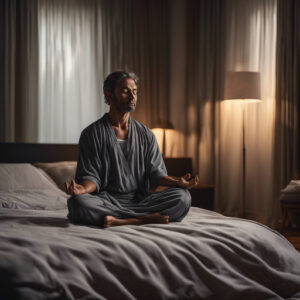Tips to help you sleep better
If you have difficulty sleeping, you understand the frustration of lying awake at night, gazing at the ceiling and anxiously waiting for morning to arrive. If this resonates with you, rest assured that you are not alone. Insomnia affects a staggering number of individuals each year, with a significant portion of the population in America experiencing its effects. Fortunately, there are several effective strategies you can employ to enhance the quality of your sleep. Some can be easily incorporated into your daily routine, while others require more dedication. However, ensuring a restful night’s sleep will make your efforts worthwhile. Now, let’s get started.
Regular exercise
Dealing with insomnia can be incredibly frustrating and can have a significant impact on your daily life. If you have difficulty achieving a restful night’s sleep, you may experience grogginess and irritability throughout the day. Surprisingly, there is a straightforward solution: exercise. Regular exercise can significantly improve your sleep quality, allowing you to fall asleep faster and enjoy more extended periods of uninterrupted rest. Regular exercise has been shown to have numerous benefits for sleep, including improved sleep quality, increased energy levels, and reduced stress. Just 30 minutes of exercise each day is all you need; spending hours in the gym is unnecessary. In addition, regular exercise can help regulate your body’s natural sleep-wake cycles. Even a light workout can have a significant impact. It is essential to maintain a regular exercise routine to reap the benefits.
In addition, incorporating regular exercise into your routine can significantly benefit your overall health and well-being. It’s important to avoid exercising too close to bedtime, as it can stimulate the brain and release endorphins. While it may provide a sense of satisfaction, it won’t improve your ability to fall asleep.
Avoid caffeine and alcohol before bed to improve sleep.
Consuming caffeine or alcohol before bed is a common trigger for insomnia, as it can disrupt your sleep patterns. It’s essential to be aware that caffeine is a stimulant that can interfere with falling asleep and lead to frequent awakenings throughout the night. This occurs because it inhibits the release of adenosine, a naturally occurring chemical that promotes drowsiness. One possible reason for experiencing difficulty falling asleep after consuming a caffeinated beverage is its impact on our body’s natural sleep-wake cycle.
Contrary to popular belief, alcohol may initially help you fall asleep, but it can disrupt your sleep later in the night, causing restlessness and disturbances. For optimal sleep quality, consuming non-caffeinated and alcohol-free beverages in the evening is advisable.
Avoid screens before bedtime.
Screen time before bed could be a potential factor affecting sleep quality. Research has indicated that the intense light emitted by electronic screens, such as televisions and other devices, can disturb our natural sleep-wake cycles, posing challenges in initiating sleep. Moreover, the blue light emitted by these devices can significantly disrupt our sleep cycles.
Please refrain from using your phone.
For better sleep quality, consider reducing your screen time in the evenings. Consider keeping your mobile phone in a different room at night and refraining from watching television an hour before bedtime. If neither of those options interests you, you can use blue-light-blocking apps on your phone or wear blue light-blocking glasses.
Try relaxation techniques before bedtime.
To enhance your sleep quality, consider incorporating activities like reading a book (preferably not on a screen), indulging in a soothing bubble bath, or enjoying some cosy moments with your partner before bedtime. These activities are known for calming effects, helping you unwind and relax. A consistent night-time routine can significantly prepare your body for a restful sleep.
Create a consistent pre-sleep routine.
Establishing a consistent bedtime routine can profoundly impact your sleep quality. It is essential to establish a consistent bedtime routine, which may include indulging in a relaxing bath. It is also advisable to establish a consistent wake-up time. This also includes weekends and days off. Initially, you may find it challenging, but once you establish a consistent routine, you’ll be amazed at the significant improvements it can make to your sleep.
Use apps to help you sleep.
At times, falling asleep can be challenging when one is preoccupied with anxiety or concerns. If you find it difficult to count sheep or unwind alone, using an app could be helpful. One practical approach is using a meditation app like Headspace or Balance. These guides will guide you through practical strategies, helping you achieve a restful night’s sleep in no time.
Consider exploring white noise or binaural beats apps for a more professional approach. These can help redirect your attention from your concerns and provide a calming background ambience.
Your bedroom should be relaxed, dark, and quiet.
Creating the ideal bedroom environment is essential for a restful night’s sleep. This involves ensuring that the room is cool, dark, and quiet. These factors play a crucial role in promoting deep and rejuvenating sleep. For optimal deep sleep, it is recommended to maintain a bedroom temperature of approximately 60⁰F. Ensuring proper ventilation in the bedroom is essential for maintaining a cool and comfortable sleep environment. Open a window to let in some fresh air. This enhances the sleep-friendly atmosphere.
In addition, a dark room creates the ideal environment for optimal melatonin production and minimises distractions caused by external light sources. Investing in black-out blinds can help create a darkened room for optimal sleep conditions. Lastly, ensuring a quiet and distraction-free environment in your bedroom can significantly enhance the quality of your sleep. Using earplugs can effectively block out any noises, including the sound of a snoring partner. By implementing these strategies, you can rest assured that you’ll be able to drift off to sleep more quickly and enjoy a peaceful night’s rest without any interruptions.
Go camping
There are numerous effective methods to alleviate insomnia. However, camping is a highly effective and enjoyable option. Camping offers a range of unique qualities that contribute to a peaceful and rejuvenating sleep experience. Spending time outdoors in nature has been proven to positively impact mental health, reducing feelings of stress and anxiety. When campers escape the distractions of modern technology and other urban conveniences, they can gather around the campfire and enjoy uninterrupted conversations without concerns about the adverse effects of blue light or EMFs.
Reset your sleep/wake cycle.
Being in nature can effectively reset your circadian rhythm by exposing you to natural daylight and the natural cycles of light and dark. Exposure to sunlight in the morning can significantly impact your sleep/wake cycle, leading to better sleep and a refreshing start to your day. Whether it’s an extended backpacking trip or just a day hike with your family, a camping trip can provide the ideal opportunity to achieve restful sleep and overcome insomnia.
Numerous effective methods exist to alleviate insomnia, such as incorporating exercise into your routine, ensuring proper ventilation in your bedroom, engaging in regular physical activity, or even enjoying a camping getaway. Consistency is key to overcoming insomnia. Stick with your chosen method and bid farewell to sleepless nights.
The Article: Discover Tried and Tested Techniques to Achieve Quality Sleep Appeared First On Upton-upon-Severn Nutritionist.
The Article: Find Proven Sleep Methods appeared first on Jane Stevens.
The Article Find Proven Sleep Methods Was Found On https://limitsofstrategy.com


Your insights on the challenges of insomnia resonate deeply with many of us who have experienced the frustration of sleepless nights. It’s intriguing how insomnia can affect not only our mood but our overall health and productivity. I’ve read that regular exercise indeed plays a crucial role in regulating sleep patterns. Personally, I’ve found that incorporating even a short daily walk or a light workout can significantly improve my sleep quality.
It’s interesting how many of us share similar experiences with insomnia. That frustration can really seep into every part of our lives, can’t it? I’ve noticed that stress and anxiety often play key roles, making those sleepless nights even harder to bear.
You’ve touched on something fundamental when it comes to insomnia—the way stress and anxiety creep in and affect not just our sleep but our overall quality of life. It’s a tough cycle, isn’t it? The anxious thoughts that race through our minds can feel relentless, making it nearly impossible to relax when we finally lie down to sleep.
I completely relate to what you’re saying about insomnia and how it bleeds into every aspect of life. It’s like this sneaky little thief that robs you of energy and focus. I’ve definitely noticed a link between my own levels of stress and those restless nights. It’s fascinating (and a bit frustrating) how our minds can spiral, especially when we’re trying to unwind.
I can really relate to that feeling of insomnia being a stealthy thief; it creeps in and takes over before you even realize it. I’ve had my fair share of sleepless nights that felt like they lingered well into the next day, affecting everything from my mood to my ability to concentrate.
It’s interesting how insomnia can feel like a slow buildup, isn’t it? One night of restless sleep morphs into a pattern that feels all-consuming. The way it impacts mood and focus is something many people overlook. It’s not just about the hours spent tossing and turning; it’s about the ripple effect that spills into our daily lives.
It’s interesting how insomnia can take on that sneaky role, isn’t it? One moment you’re feeling relatively fine, and before you know it, your sleep becomes disrupted, and the aftereffects sneak into your daily life. I totally get what you mean about those nights feeling like they stretch onward into the next day, weaving themselves into your mood and focus. It’s as if that tiredness lingers not just physically, but also emotionally.
It’s really something how insomnia can creep into our lives like that. It seems simple on the surface, but it’s almost like a ripple effect—once your sleep is disrupted, everything else feels off-kilter. It’s not just the lost hours in bed, but the way those sleepless nights can twist your thoughts and amplify stress. I’ve noticed that when my mind races, especially late at night, it creates this feedback loop that makes quieting those worries nearly impossible.
Isn’t it wild how insomnia just sneaks in like an uninvited guest at a party, full of bad dance moves and loud opinions? I mean, you think you’re winding down for the night with a nice cup of chamomile, and suddenly, your mind is hosting an all-night symposium on every questionable life choice you’ve ever made. It’s as if my brain has a “let’s worry about that time I forgot to pay my library fine in college” autoplay feature that goes off the second I try to relax.
It’s really something how insomnia can feel like it has a mind of its own, right? When stress creeps in, it’s like a cycle that feeds on itself. I’ve found that often when I’m trying to unwind, my brain decides it’s the perfect time to replay every little worry or thought from the day. Sometimes, I even find myself hoping the alarm will just go off so I can escape the cycle of tossing and turning.
It’s true, that frustration does seep into so many aspects of life when insomnia hits. I find it interesting how interconnected our mental and physical health really are. Just a few sleepless nights can leave me feeling on edge, making routine tasks seem overwhelming.
I completely relate to what you’re saying about frustration creeping into daily life during bouts of insomnia. It’s fascinating—and a bit unsettling—how those few sleepless nights can create a domino effect on our mental state. I’ve noticed that even my patience runs thin, and things I’d normally tackle with ease start to feel like monumental tasks.
I get that feeling all too well; I recently came across some helpful tips for easing neck and shoulder pain that might be just what you need to calm those tensions when sleepless nights take their toll.
‘Neck and Shoulder Pain Relief: Effective Comfort Tips’
https://deepernyc.com/neck-and-shoulder-pain-relief-effective-comfort-tips/.
I really appreciate your perspective on this. It’s fascinating how intertwined our mental and physical health really is, isn’t it? I’ve also noticed that even just a couple of sleepless nights can flip my mood upside down and turn my usual routine into a monumental task.
It really is interesting how closely our mental and physical health are linked. Those sleepless nights can make everything feel heavier, can’t they? It’s amazing how our minds and bodies react to that simple change in routine. I’ve noticed that even small adjustments, like a few late nights or stress, can impact my energy and mood for days.
It’s so true that the frustration of insomnia can shadow our daily lives in unexpected ways. I’ve found that when I’m caught in that cycle of sleeplessness, everything feels a bit off—my mood, my focus, even my interactions with others. It’s like trying to function on a low battery.
You’ve captured that feeling perfectly. When insomnia creeps in, it’s like stepping into a fog where each day can feel a little blurred around the edges. I’ve noticed how those sleepless nights can ripple through our routine, turning little tasks into bigger hurdles. It’s not just about feeling tired; it’s how that fatigue seeps into everything we do—from our ability to concentrate on a project to how we engage in a conversation with a friend or colleague.
It’s true, the way insomnia infiltrates our daily lives can be so overwhelming. I often find that those sleepless nights leave me feeling unproductive and irritable the next day, and it becomes a cycle that’s hard to break.
I can definitely relate to what you’re saying. Those sleepless nights can feel like a black hole, pulling everything else down with them. I’ve noticed that when I’m not rested, my concentration just goes out the window, and the smallest tasks can feel monumental. It does seem to create this frustrating cycle where irritability and lack of productivity feed off each other.
I completely understand where you’re coming from. Those sleepless nights really can feel suffocating, and it’s intriguing how much our rest—or lack thereof—can affect everything else in our lives. It’s often eye-opening to realize how interconnected our physical state is with our mental clarity.
It’s true; those sleepless nights have such a way of creeping into every corner of our lives, don’t they? It’s like a domino effect—when I’m not rested, my patience runs thin, my creativity stalls, and even my appetite shifts. Doing more research on the science of sleep has been eye-opening for me; I’ve come across studies linking sleep deprivation not just to mood swings but also to long-term physical health issues.
I’ve been exploring how acupuncture can really complement TMS treatment, and it’s fascinating how these techniques might address both our physical and mental challenges together.
‘Acupuncture Techniques for Enhanced TMS Treatment’
https://deepernyc.com/acupuncture-techniques-for-enhanced-tms-treatment/.
You’re touching on some really important points there. Sleep can feel like the foundation of our daily lives, and when it’s off-kilter, everything else can begin to wobble. It’s wild how lack of rest can affect our mood, creativity, and even what we crave to eat. I’ve read some of the same studies, and it’s pretty alarming how sleep deprivation is linked to serious health issues down the road. It’s almost like we underestimate sleep’s role in our overall health until we’re caught in that cycle of fatigue.
You bring up a really important point about how our physical state affects our mental clarity. It’s fascinating, isn’t it? When we’re not sleeping well, it can ripple through our entire day. Simple tasks can feel monumental, and decisions that usually seem straightforward become overwhelming.
You bring up such an important point about sleepless nights and their overwhelming nature. It’s fascinating when you dig into how intertwined our physical and mental states really are. When we’re deprived of sleep, it’s not just fatigue that sets in; it can cloud our judgment, dull our creativity, and even impact our emotions. It’s like trying to navigate through fog—everything feels just a little more challenging.
It’s interesting how a lack of sleep can create such a ripple effect in our daily lives. When you’re in that cycle, everything feels heavier, and even the smallest decisions can seem like climbing a mountain.
You’ve hit the nail on the head about how insomnia throws a wrench in so many aspects of our lives. It’s crazy how a few lost hours can mess with our mood and productivity, right? It sounds like you’ve found a solid routine with your daily walks or workouts. There’s something special about that movement, even if it’s just for a little bit.
It’s really great to hear that my thoughts on insomnia resonate with you. It’s a tough battle, isn’t it? The cycle of sleeplessness can feel endless, and it’s interesting how just a few tweaks to our lifestyle can offer some relief. Your experience with regular exercise makes a lot of sense. There’s something about movement that seems to shake off the stress of the day and helps our bodies wind down when it’s time for bed.
It’s so refreshing to see this important topic brought to light, especially since sleep issues seem to have become increasingly prevalent in our fast-paced world. I can completely relate to the experience of lying awake at night, consumed by thoughts and worries. For me, this was particularly challenging during my final year of university. The stress and anxiety that came with exams often resulted in sleepless nights, leaving me groggy and on edge the next day.
I completely understand what you’re saying about the struggles of sleepless nights, especially during such a high-pressure time like finals. I went through a similar experience during my last year of college, and those moments of lying awake, replaying the day in my mind and worrying about what tomorrow might bring, felt endless. It’s interesting how our modern lives contribute to this issue—everything feels so connected and fast-paced, making it hard to truly unwind.
I can definitely relate to that feeling of lying awake, replaying the day and worrying about tomorrow. It’s surprising how those moments can feel like they stretch on forever, isn’t it? I think about how our lives are so intertwined with technology—there’s always a notification buzzing or an email to check, which makes it hard to disconnect and truly relax.
I’ve been thinking about your experience with sleepless nights too; I recently came across some insights on how acupuncture might help restore sleep regularity, and it really resonated with what we’re all facing in this fast-paced world.
‘Acupuncture for Insomnia: Regaining Sleep Regularity’
https://deepernyc.com/acupuncture-for-insomnia-regaining-sleep-regularity/.
I hear you. That end-of-year pressure at university can really mess with your sleep. It’s wild how much our minds get racing when we’re stressed about deadlines and exams. I remember those nights spent tossing and turning, running through all the “what ifs” in my head.
I can totally relate to that. The pressure at the end of the semester really takes a toll on both sleep and mental clarity. It’s crazy how our thoughts can spiral when we’re anxious about deadlines. I remember those nights too, trying to quiet my mind while feeling the weight of all the tasks ahead.
I completely get that. The end of the semester always feels like a whirlwind, doesn’t it? It’s almost like there’s this collective anxiety among everyone that just compounds the stress. I remember those nights too—trying to cram everything in while your mind races through a checklist of tasks. It’s tough to not let the pressure distort your thinking. I’ve found that practicing mindfulness sometimes helps in those intense moments, even if it’s just for a few minutes.
I can relate to that feeling so much. Those late nights filled with anxiety and racing thoughts can feel endless. It strikes me how our minds can spiral when we’re under pressure, as if our brains take the opportunity to explore every possible “what if.” I remember the nights when I would write down everything that was worrying me just to get it out of my head, which actually helped me sleep a bit better.
It’s great to hear your thoughts on those sleepless nights. The way our minds can run wild under pressure is something many of us know all too well. Your approach of writing down worries is a practical strategy. It’s interesting how putting thoughts on paper can create a little distance from them, almost like saying, “Hey, I see you, but you don’t have to take up all this space in my head right now.”
I can relate to that experience of lying awake at night, especially during high-stress periods like exam seasons. It’s interesting how universal that feeling seems to be; so many people face the challenge of their minds racing when they’re supposed to be unwinding. I remember during my own university days, I also found myself caught in a loop of thoughts about deadlines and future plans, making sleep elusive.
It’s such a common struggle, isn’t it? Those racing thoughts can feel relentless, especially when you’re trying to settle down. I remember my own nights filled with similar worries about deadlines and what came next. One thing that helped me was developing a little pre-sleep routine. Even just jotting down the worries or to-do lists before bed made a difference; it felt like I was putting it all away for the night. Have you found anything that helps you manage those thoughts? It’s always interesting to hear how others combat that midnight chatter.
You’ve hit the nail on the head about those sleepless nights! It’s fascinating how common that experience is during crunch times. When I was in university, I found that the pressure of deadlines really cranked up my internal dialogue—my mind would race through to-do lists, class notes, and even hypothetical future scenarios.
It’s interesting how these experiences weave through so many of our lives, isn’t it? That racing mind seems to amplify worries during times when we’re meant to be resting. I remember those nights spent tossing and turning, replaying thoughts about assignments and what the future might hold. What helped me eventually was trying to create a buffer between my day and night—setting aside time to reflect on my thoughts earlier in the evening.
It’s a common struggle, isn’t it? That sense of lying awake with thoughts racing seems all too familiar, especially during high-pressure times like university. You’re not alone in feeling that stress creep in during finals; many experience a similar whirlwind of anxiety. What’s critical—for those navigating such periods—is finding methods to break that cycle of overthinking.
This post really resonates with me. The struggle for quality sleep is something I think many of us can relate to, yet it often feels like such a personal experience. I’ve been there—tossing and turning, staring at the clock with each ticking second feeling like an eternity. It’s interesting how something as fundamental as sleep can become such a complex puzzle.
It’s really comforting to hear you share your experience. The way you described that feeling of tossing and turning perfectly captures what so many of us go through. Sleep can feel like this elusive thing, almost as if it has its own agenda, and it’s easy to feel isolated in that struggle. It makes sense that something so essential can turn into a complex puzzle—we have so many factors at play, from stress and anxiety to the environments we create around ourselves.
I really resonate with what you’ve shared about sleep feeling like it has its own agenda. It’s so true that the process of trying to catch those elusive z’s can feel more like a complex puzzle than a simple nightly routine. I find myself in that struggle too, especially when stress or anxiety creep in. It’s interesting how our environments play such a vital role; even the smallest change—a new pillow or an extra light—can disrupt that delicate balance.
I totally relate to that sense of struggle; it’s fascinating how micro-acupuncture might offer some relief by addressing the tangled web of factors impacting our sleep.
‘Micro-Acupuncture and Treatment Benefits’
https://deepernyc.com/micro-acupuncture-and-treatment-benefits/.